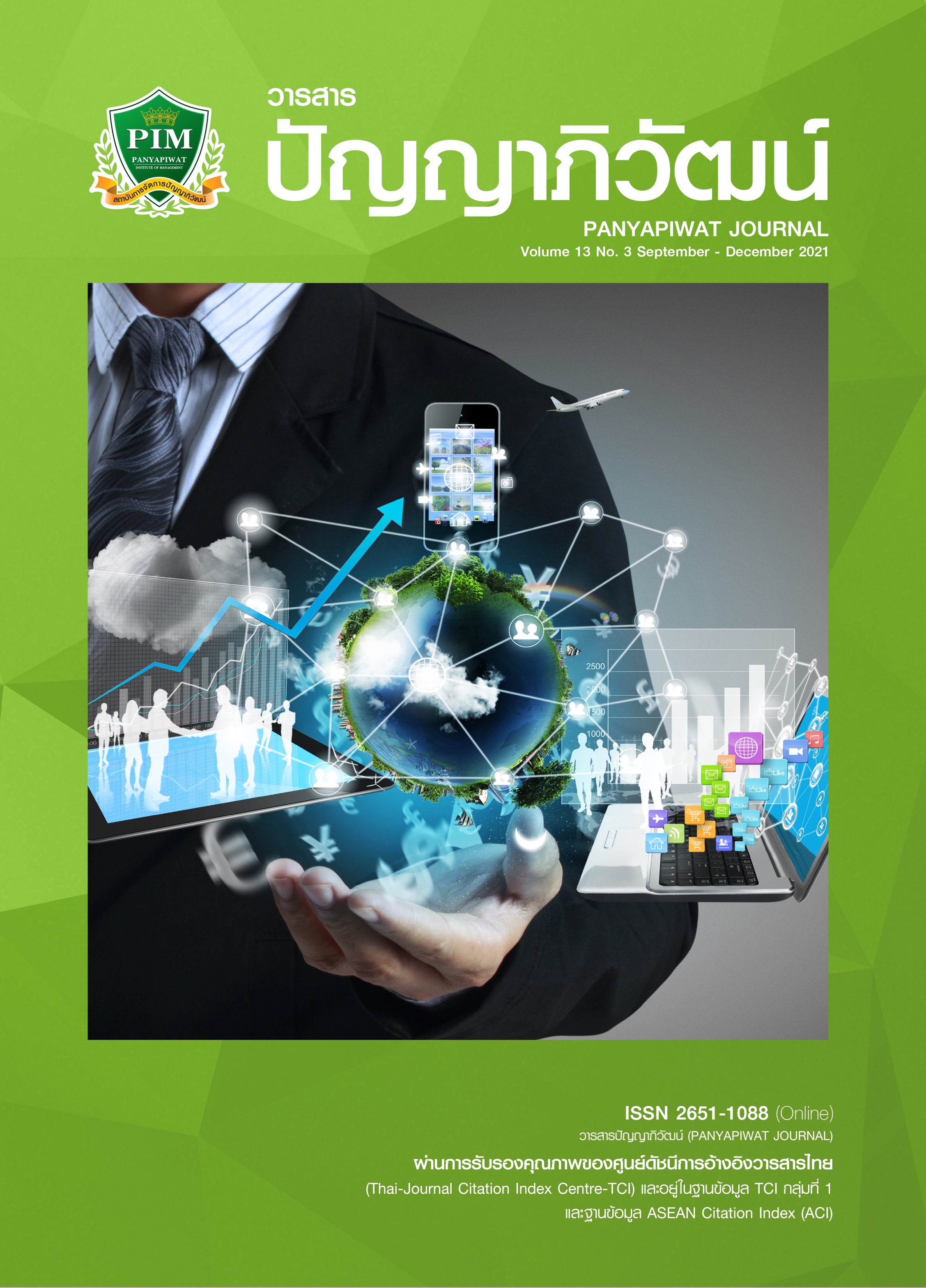การพัฒนารูปแบบการจัดการความเครียดบริษัท ท่าอากาศยานไทย จำกัด (มหาชน) (ทอท.)
Main Article Content
บทคัดย่อ
งานวิจัยนี้มีวัตถุประสงค์เพื่อศึกษา 1) สภาวะการจัดการความเครียดบริษัทท่าอากาศยานไทย จำกัด (มหาชน) (ทอท.) ในปัจจุบัน 2) แนวทางการพัฒนารูปแบบการจัดการความเครียดบริษัทท่าอากาศยานไทย จำกัด (มหาชน) (ทอท.) ใช้ระเบียบวิจัยแบบผสมด้วยแบบบันทึกข้อมูลการวิจัยเอกสาร จำนวน 100 รายการ ประชากรคือ บุคลากร ทอท. จำนวน 7,535 คน กลุ่มตัวอย่างจำนวน 384 คน ทำการสำรวจด้วยแบบสอบถามและการสัมภาษณ์ เชิงลึกแบบกึ่งโครงสร้าง เจาะจงผู้ให้ข้อมูลสำคัญคือ ผู้บริหารระดับสูง ทอท. จำนวน 15 คน จาก 152 คน วิเคราะห์ ข้อมูลด้วยสถิติเชิงพรรณนาร่วมกับการวิเคราะห์เนื้อหาและแก่นสารพบว่า ทอท. มีรูปแบบองค์การสมรรถนะสูง ไม่มีมาตรฐานระบบการจัดการความเครียด มีวิธีแทรกแซงการจัดกระทำจำนวน 30 จาก 37 รูปแบบในอุดมคติ และช่องว่างในระดับองค์การ ได้แก่ ระบบการสนับสนุนทางสังคม และในระดับบุคคล ได้แก่ 1) การฝึกผ่อนคลาย 2) การฝึกตอบกลับทางชีวภาพ 3) การให้คำปรึกษาจิตวิทยาเชิงป้องกัน 4) การรักษาด้วยจิตวิทยาการรับรู้ และพฤติกรรม 5) บริการรับฟังจากนักจิตวิทยา 6) โปรแกรมช่วยเหลือบุคลากร รูปแบบองค์การสุขภาพดี ด้วยพื้นฐานการจัดการความเครียดองค์รวมทีมหนึ่งเดียว อัตลักษณ์ ทอท. คือ แนวทางสมดุลสนามบินที่มีชีวิต ประกอบด้วย 1) ภาวะผู้นำเอื้ออำนวยเปิดใจจัดการความเปลี่ยนแปลง ภูมิใจพัฒนาทรัพยากรมนุษย์และองค์การ 2) คุณค่าร่วมสุขภาวะทีมพลวัต มั่นใจมาตรฐานครองตน ให้ใจบริการครองคน 3) บรรยากาศที่ปลอดภัยด้าน จิตสังคม ร่วมใจครองงาน
Article Details
“ข้าพเจ้าและผู้เขียนร่วม (ถ้ามี) ขอรับรองว่า บทความที่เสนอมานี้ยังไม่เคยได้รับการตีพิมพ์และไม่ได้อยู่ระหว่างกระบวนการพิจารณาลงตีพิมพ์ในวารสารหรือแหล่งเผยแพร่อื่นใด ข้าพเจ้าและผู้เขียนร่วมยอมรับหลักเกณฑ์การพิจารณาต้นฉบับ ทั้งยินยอมให้กองบรรณาธิการมีสิทธิ์พิจารณาและตรวจแก้ต้นฉบับได้ตามที่เห็นสมควร พร้อมนี้ขอมอบลิขสิทธิ์บทความที่ได้รับการตีพิมพ์ให้แก่สถาบันการจัดการปัญญาภิวัฒน์หากมีการฟ้องร้องเรื่องการละเมิดลิขสิทธิ์เกี่ยวกับภาพ กราฟ ข้อความส่วนใดส่วนหนึ่งและ/หรือข้อคิดเห็นที่ปรากฏในบทความข้าพเจ้าและผู้เขียนร่วมยินยอมรับผิดชอบแต่เพียงฝ่ายเดียว”
เอกสารอ้างอิง
Akanji, B. (2015). Organizational Stress: Theoretical Reflections and Proposed Directions for Management Research. Economic Insights-Trends and Challenges, 4(4), 27-36.
Agarwal, R. K. & Kaur, I. (2016). Work Related Stress: Overall Impact and Prevention. International Journal of Multifaceted and multilingual Studies, 3(4), 1-11
Airports of Thailand Public Company Limited (AOT). (2019). Sustainability Development Report: Inspiring Sustainable Airports. Bangkok: AOT. [in Thai]
Bailey, T. S., Cheng, Y., Idris, A., & Arphorn, S. (2016). Macro-level Policy and Practice. Psychosocial Factors at Work in the Asia Pacific from Theory to Practice. Switzerland: Springer International Publishing.
Bellamy, J. L., Tim, A., & Geyer, W. (2007). Development of a Working Model of How Human Factors, Safety Management Systems. Norwich: Crown.
Bergh, Z. & Gelden, D. (2013). Psychology in the Work Context (5th ed.). Cape Town: ABC press.
Bunthukul, A. (2011). Occupational Medicine. Bangkok: Nopparatrajethanee Hospital Department of Medical Services Ministry of Public Health. [in Thai]
Cahill, J., Cullen, P., & Gaynor, K. (2019). Interventions to Support the Management of Work-Related Stress (WRS) and Wellbeing/mental Health Issues for Commercial Pilots. Cognition, technology & Work, 22(5), 1-31.
College of Management Mahidol University (CMMU). (2020). Burn Out in the City. Retrieved February 3, 2020, from https://www.posttoday.com/life/work-life-balance [in Thai]
Cooper, C. L. (1998). Theories of Organizational Stress. New York: Oxford University Press.
Cox, T., Griffiths, A., & Rial-Gonzales, E. (2000). Research on Work-related Stress. Nottingham: Institute of Work Health.
Dahanayake, L., Jasinghe, A., & Opatha, H. 2019). A Managerial Intervention to Strengthen the Healthy Organizational Culture of Sri Lanka. Health Systems and Policy Research, 61, 79.
Dollard, F. M. (2019). Psychosocial Safety Climate a New Work Stress Theory. Switzerland: Springer International Publishing.
EU-OSHA. (2014). Calculating of the Work-related Stress and Psychosocial Risk-a Literature Review. Luxembourg: Publications Office of the European Union.
Havermans, M. B. (2016). Process Variables in Organizational Stress Management Intervention Evaluation Research: A Systematic Review Work Stress. BMC Public Health, 18, 642.
Hodge, K. & Danish, S. (2012). Developing a Conceptual Framework for Life Skills Interventions. The Counseling Psychologist, 41(8), 1125-1152.
Houdmont, J. & Leka, S. (2010). Occupational Health Psychology. West Sussex: Wiley-Blackwell.
HSE. (2007). Manaing the Causes of Work-related Stress a Step-by-step. Norwich: Crown.
Jex, M. S. & Brit, W. T. (2014). Organizational Psychology: A Scientist-practitioner Approach (3rd ed.). New Jersey: John Wiley & Son Inc.
Joyce, S., Modimi, M., Christensen, H., & Mykletun, A. (2015). Workplace Interventions for Common Mental Disorders: A Systematic Meta-review. Psychological Medicine, 46, 683-697.
ILO. (2012). Stress Prevention at Work Checkpoints: Practical Improvements for Stress Prevention in the Workplace. Geneva: ILO Publications.
Intarakanhang, A. (2008). Research Synthesis Concerning the Stress and Coping of Thai People. Behavior Science Journal, 14, 135-150. [in Thai]
Mintzberg, H., Ahlstrand, B., & Lampel, J. (2010). Management. New York: AMACOM.
Nielson, K. M. & Noblet. A. (2018). Organizational Interventions for Health and Well-being: A Handbook for Evidence-Based Practice. London: Routledge.
Nike, I. De Jonge, J. Gevers, J., & Houtman, I. (2018). Work Stress Interventions: Discovery Method. International Journal of Environmental Research and Public Health, 15, 332.
Pignata, S., Winefield, A. H., Boyd, C. M., & Provis, C. (2018). A Qualitative Study of HR/OHS Stress Interventions in Australian Universities. International Journal of Environmental Research and Public Health, 15(1), 103-119.
Lewis, R. & Zibarras, L. (2013). Work and Occupational Psychology: Integrating Theory and Practice. London: Sage Publications.
Sriprasertsuk, U. (2015). Stress Management: The Basic Way to Healthy Organization. Pranakhon Rajaphat Journal, 10(2), 203-211. [in Thai]
Tassanapak, K. (2007). Healthy Organization. Master’s Thesis, National Institute of Development Adminiatration. [in Thai]
Tetrick, E. L. & Winslow, J. C. (2015). Workplace Stress Management. The Annual Review of Organizational Psychology and Organizational Behavior, 22, 16.11-16.21.
Toderi, S. & Balducci, C. (2015). HSE Management Standards Indicator Tool. International Journal of Workplace Health Management, 8(2), 92-108.
Ukkarabawon, J. (2014). Emo-meter Employee Well-being and Engagement Diagnostic Tool. Bangkok: Personnel Management Association of Thailand. [in Thai]


